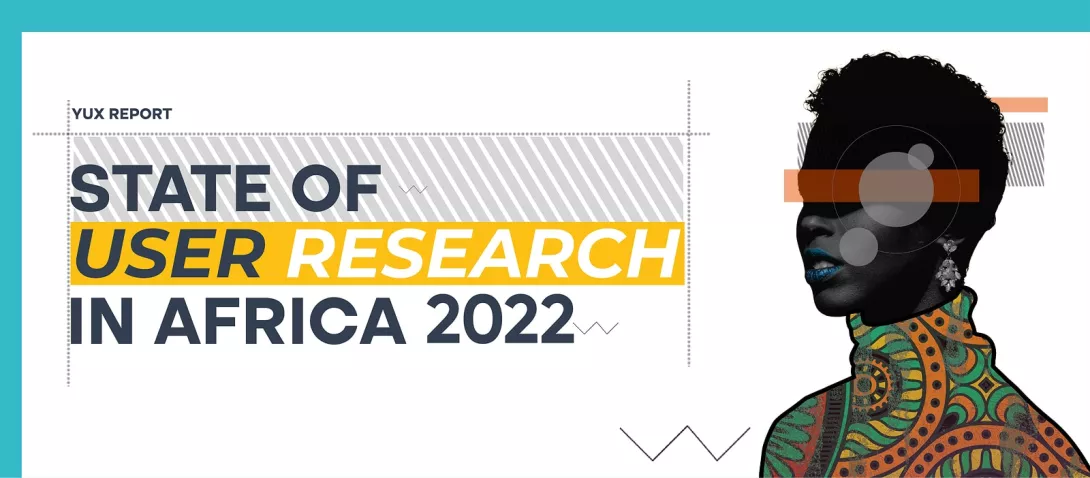
Every year since 2021, YUX Design conducts research to assess the State of User Research in Africa. For the 2022 report, we looked at the tools used for research, some of the challenges of conducting research, stakeholder buy-in, and how designers and researchers grow their careers plus their salaries!
YUX, a pan-African research and design agency headquartered in Senegal and with teams in Lagos, Accra, Kigali, Nairobi and Abidjan, launched its second free report on the “State of User Research in Africa.” Our work at YUX focuses on user research because we think it is crucial and often overlooked when we talk about building services adapted to specific populations and needs. We want to help researchers, product managers, and designers learn from their peers, improve their practices, and tell their boss: “let’s go talk to some users”!
This report was created in partnership with several design communities across Africa UX Ghana, UX Salon, Dear Designer, Friends of Figma Lagos and Cotonou, UX Kitchen Nairobi, Asa Coterie, UX South Africa, She Code Africa, UX Joburg.
YUX was built in 2015 with the mission to create digital products and services adapted to the African context and to make design accessible to all on our continent. This year alone, YUX has participated in bettering user experience in fields such as Agritech, health, fintech, and education on the continent with companies such as GSMA, Agromall, Google, MSF, Institut Pasteur, Meta, Orange, etc…
As a research-driven user experience design agency, YUX noticed there are lots of resources on UI, and UX design on the continent and little to none on UX Research. With the State of User Research in Africa report, YUX is collecting important data to create resources on the subject and fill the gap.
The result of this study is based on remote interviews conducted with 22 industry professionals from various countries across the continent and 164 survey responses from 23 countries. This study summarizes tools, methods, and challenges UX practitioners across the continent experience conducting user research or user design at large plus salaries and growth within the industry.
Here is a few key findings from the report this year's report:
Maturity of user research in Africa
User research is now becoming a pan-African phenomenon! UX research practitioners in 23 countries across the continent responded to our studies
More and more organizations within the continent seem to be investing in in-house UX professionals! Only 31% of our respondents indicated they were freelancers.
Research Methods
The most used research methods are usability tests, individual interviews, and surveys. Diary studies are the least used.
Google Forms & Google Docs continue to take the lead for tools used in research, and Miro leads when it comes to synthesizing the research, but Notion is growing fast compared to last year.
Barriers to conducting research remain the same as last year with participant recruitment taking the lead, check out the work LOOKA Panel is doing to solve this!
Challenges faced by researchers
Top 3 perceived barriers to conducting research remain the same; participant recruitment, time availability, and inclusion within the product development process.
Stakeholders' buy-in is also still a problem, however, UX researchers and UX leads have found creative strategies to convince their bosses such as growing research champions internally and learning how to speak the numbers!
Careers & education
UX researchers and designers in Ghana, Kenya, and South Africa are earning the big bucks, with up to 30% of them being paid more than $3,000 a month!
There are more UX researchers than UX designers with salaries above $3,000 a month, it seems like specialization pays!
The majority of respondents are self-taught and gained research and design training via online courses.
This year, we wanted to go a little bit further and explore the careers of UX researchers and designers, how they got into this industry and how they are growing within it;
We also touched a bit on the broad topic of ethics, we observed that there is a slight variation in their understanding or expectation of what research ethics is.
Stakeholders perceive research ethics as making sure the integrity of the research is kept. For instance, following data protection laws. UX researchers, on the other hand, mostly perceive ethics as making sure the user feels as comfortable and safe as possible providing their opinions, thoughts, and personal information, for instance, iterating to users how their data will be used and protected. As UX research continues to mature in Africa, there is a need for more and more conversations on ethics throughout the research process from consent, and incentives, to the use of data and the best practices!
The report is available to download here. Enjoy!
